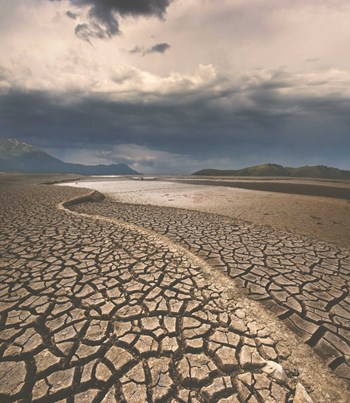
On a rainy day a few years ago in front of the Massachusetts State House, plenty of viewers watching Fox News on TV got a good chuckle, along with the Fox news reporter covering Beacon Hill that day. On the sweeping grassy slope behind the reporter, TV cameras captured sprinklers blasting the rain-soaked lawn with yet more water. A malfunction of lawn irrigation equipment couldn’t have been more public, yet it wasn’t corrected until after the embarrassment of being “caught on camera.”
Is water so cheap and plentiful that blatantly wasting it is of no concern?
For community associations, water and sewer costs can vary considerably, whether they are delivered as municipal services or self-managed as private, on-site well and septic systems—or some combination of the two. In either case, the costs of water delivery in association budgets can almost always be lowered.
Managers and industry experts agree: The problem is that no one wastes a second thinking about water in a community until local drought conditions spur a restriction on water use. This usually includes a ban on outdoor uses such as landscape irrigation, swimming pools and car washing.
Drought conditions happen regularly, even in the water-rich New England states. Frank Koll, president of GreenScapes Lawn & Garden Services in Arlington, Massachusetts, says, “The weather in New England not only changes from season to season but also can be extremely variable within each season. For instance, communities outside of Boston’s MWRA [Massachusetts Water Resources Authority] often depend on municipal well water and reservoirs that routinely experience medium to severe drought conditions. There are probably 75 towns like that… some of them have automatic restrictions from May to September every year.”
He cites the town of Hingham as an example, “where 50-60 percent of properties have lawn irrigation, but sprinklers are regulated for use to certain hours and days.” Installing wells on-site, strictly for irrigation, is popular with many—if not most—condo properties with extensive lawns and landscaping. This practice does not exempt associations from outdoor water bans, however. Koll reports “you may be subject to a ban, even with a private well, depending on your town’s bylaws.” In Massachusetts, the Department of Environmental Protection (MassDEP) allows municipalities to regulate or otherwise restrain the use of water on public or private property (regardless of whether the supply source is public or private) under state law (Ch. 40, Sect. 41A). “There have been court cases,” states Koll, “where the town won on this issue, where [ground] water was considered public property… and not privately-owned.”
Conserving Water is Not Just About Money
Because the MWRA water source at Quabbin Reservoir has maintained [annual] volumes averaging 95 to 98 percent of capacity since 2005, Boston residents may not be so concerned about supply. There are, however, other reasons for prudent water use.
Koll notes that good water management goes beyond saving money on water/sewer bills, or obeying water bans. Irrigation of lawns and landscape plants and trees uses a huge volume of water. When it’s not managed correctly, too much or too little water can damage landscape plantings.
As he points out, “Overwatering has been cited as one of the key contributors of poor plant health. Drought conditions, as we had in summer of 1999 and August 2007 will also severely stress plants and can cause enormous damage to your landscapes. Irrigation methods need to be dynamically managed so that your plants stay healthy and that water usage is optimized.”
He suggests that “condo associations have a great opportunity, compared to single-family homes, for conserving water.” While cutting down domestic water consumption by individual unit dwellers cannot be directly controlled, it can be encouraged and supported with community-wide education and communication. This holds true whether water/sewer metering is installed at individual units or not. But beyond domestic consumption, virtually every community board manages all outdoor water uses—and irrigation eats up a huge volume of water. Boards and managers can begin by adopting “green” methods of capturing and using rainwater for landscaping. As Koll says, “It rains in the spring… but how do we save all that water for August when we need it? Rainwater can be captured in flat containers that fit against a wall [or] between buildings” so that rain barrels don’t have to be conspicuous.
The main problem for condo properties with irrigation systems, Koll believes, is “the ‘set it and forget it’ mentality” with rain sensors or soil sensors. These should automatically turn on water as needed, according to weather conditions. However, equipment is often installed improperly, he says, “like under a downspout…” All the elements, wells, pumps, pipes, nozzles and wiring, need to be maintained. “Just by replacing [leaky] nozzles,” Koll insists, “the water savings is huge… and you could see a return-on-investment in just weeks.”
When it comes to improvements to water infrastructure systems, spending money or upping fees is a hard sell for a condo board, he notes, “because water is so cheap to begin with.” He suggests three water-management and cost-saving strategies that associations can easily institute, “Move towards organic lawn care because it uses less water over time; install a rainwater capture and storage system; and especially, audit your irrigation systems each year to make sure things are working efficiently and check for damage due to weather, wildlife and even people mowing or using the lawn.”
Be Wary of Unlicensed Contractors
John Finocchi, a principal in Irrigation Repair Co. of Hanover, Massachusetts, says, “With water management, it’s always reactive [to an emergency] and not proactive. We helped a client who had tried to save money on the irrigation installation and gotten the cheapest controls [but] it was a water-hog of a system… It failed after only five years.” He points out that “you can get really efficient programs with the latest equipment that monitor the weather. We installed a system for the City of Somerville that cut their water costs by 28 percent. That translates into a huge volume of water.”
The reason these savings are important for municipal water customers, he adds, “is because the price per gallon of water goes up as volume increases. This is to discourage wasting water and to promote conservation. Towns that have put in huge pumping and filtration systems don’t want to encourage [lawn] irrigation, and some Massachusetts communities have outright banned the use of domestic water for irrigation.”
Besides irrigation systems, Finocchi’s company also installs wells for both irrigation and drinking water, so he is able to integrate systems. He warns that, at least in Massachusetts, managers should be careful choosing vendors. “I’ve talked to condo managers as new clients, and they often admit, ‘one of the biggest problems we have is with the irrigation contractor.’ This happens, I believe, because there is no license required in Massachusetts for this service.” Within New England, there is a licensing requirement for lawn irrigation contractors in Rhode Island and Connecticut. In the northern New England states, however, he says, “The season is so short, landscape irrigation is not that common.”
“We had a condo community in Rockland, Massachusetts,” Finocchi continues, “where an irrigation contractor took a $2,500 deposit and didn’t come back. We then went in and replaced systems controls, including a weather-adjustment controller. In Scituate, we had a community with about 92 units, where the landscape contractor had unskilled workers, and piping, valves, wiring… got installed incorrectly. The wiring had all burned up; then one worker pulled everything apart trying to fix it, and couldn’t get it back together. We had to re-wire the system with new controls and valving.
“I also get hired as a consultant,” he says. “Over the years, I’ve given about ten depositions in court, when unscrupulous contractors have gotten sued.” He stresses that the industry requires multiple skills that are increasingly technical. Consequently, his staff receives ongoing training, both to keep up with equipment upgrades and to meet the requirements of licensing.
Simple Solutions
A number of water customers contract directly with outside vendors for their water supply services, similar to the delivery of electricity or home heating oil. One of them is Aquarion Water Co. which serves as the water utility for 200,000 households in Connecticut, Massachusetts and New Hampshire. Company representative Ronit Goldstein, in the Hingham, Massachusetts, office, agrees that “irrigation systems are what use the most water.” To discourage overuse in her service area, “municipal customers are charged a higher rate for volumes over 100 cubic feet. The main incentive is to pay less if you use less.”
As a water supplier, she notes, “We’re heavily regulated. We need approval from the [Massachusetts] Department of Environmental Protection to institute a water restriction. There are different levels [of restriction] depending on the emergency, starting with ‘voluntary’… from there it will go to mandatory bans on outside use for certain hours or on alternating days. We’re also regulated as to how much we can pump daily from each source. To prevent loss, we do [infrastructure] leak detection, at least annually, in the communities we serve.”
Then there’s filtration and conditioning. “The Department of Public Utilities, along with the DEP, regulates how we test water and treat it,” states Goldstein. “We test the water both before it’s treated and after it’s treated, and we test for about 100 compounds.”
For communities trying to conserve water, she agrees with Koll in recommending “green” strategies. Saving rainwater is a good way to start—it’s easy and low-cost. She says that Aquarion has enlisted the help of The New England Rain Barrel Company. “They provide a discounted barrel and kit [at about $70] to our customers,” Goldstein says. “In 2010, we sold over 100, but the number varies every year.” Ultimately, she adds, the most simple of solutions can make a big difference in cutting water use, “like making an adjustment, on a valve or other equipment.”
“Conserving water,” she believes, “is really all about education.”
Marie Auger is a Massachusetts-based freelance writer and a frequent contributor to New England Condominium.





Leave a Comment